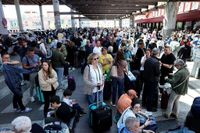On April 28, 2025, a massive power outage swept across the Iberian Peninsula, plunging Spain and Portugal into chaos and prompting the Spanish government to declare a state of emergency. The blackout, which began around 12:30 PM local time, left millions without electricity, water, and communication services, affecting major cities including Madrid, Barcelona, Lisbon, and Porto.
Reports indicate that the outage originated from a sudden loss of 15 gigawatts of power from Spain's electricity grid, which dropped dramatically from 26 gigawatts to 12 gigawatts within moments. Spanish Prime Minister Pedro Sánchez described the event as "exceptional and totally extraordinary," emphasizing that the cause was still being investigated.
While the exact reason for the blackout remains unclear, Sánchez noted a "strong oscillation" in the European grid as a potential factor. He urged citizens to refrain from speculation as authorities continued to explore various hypotheses, including the possibility of a cyberattack or a rare atmospheric phenomenon that might have disrupted electrical voltages.
By late Monday evening, approximately 20% of Spain's power had been restored, with efforts ongoing to bring back electricity to the remaining affected areas. The Spanish grid operator, Red Eléctrica, reported that 35% of the energy demand had been met by midnight, translating to about 9,200 megawatts. However, Portuguese authorities warned that full restoration of their power grid could take up to a week.
The impact of the blackout was felt across public infrastructure. In Madrid, trains ground to a halt, and subway stations were plunged into darkness as lights and departure boards failed. Traffic lights went dark, causing massive traffic jams and forcing police to direct cars manually. In Lisbon, similar scenes unfolded, with the streets choked with vehicles and throngs of passengers stranded at public transport hubs.
In the aftermath, many residents rushed to supermarkets to stock up on essentials. Reports from various cities revealed empty shelves, particularly for items like candles, batteries, and non-perishable food. One shop owner in Madrid noted that radios and torches were flying off the shelves as the public scrambled for sources of light and information. A local resident, Ben Lambert, described huge queues at his supermarket, where the water had sold out within an hour.
As the crisis unfolded, emergency services were activated across both countries. Hospitals and critical services in Portugal switched to backup generators, while Spain deployed around 30,000 police officers to maintain order and assist those in need. In some cases, rescue workers were still attempting to evacuate passengers stranded on trains, with reports of one high-speed train from Seville halting for over two hours outside Zaragoza.
Despite the chaos, there were moments of community spirit. In Barcelona, some residents took the opportunity to enjoy the outdoors, gathering on terraces and in parks as they waited for power to be restored. One local, Monste Cortes, remarked on the unexpected social interactions that arose from the outage, stating, "We are lucky. Some people got trapped in the metro. And there is a positive side: We are talking more with each other."
The Spanish government has emphasized that restoring power is a top priority. Sánchez stated, "We are going to go through some critical hours before we totally recover electricity," highlighting the complexity of the situation. In the meantime, residents were urged to use their phones responsibly, as telecommunications networks struggled to cope with the surge in demand.
Experts have weighed in on the potential causes of the blackout, with speculation ranging from the effects of extreme temperature variations to the growing reliance on renewable energy sources like solar power. Before the outage, solar and wind energy accounted for nearly 80% of Spain's electricity generation. Some analysts have pointed out that this shift towards renewables may have left the grid more vulnerable to sudden disruptions.
As the investigation continues, many are left wondering when normalcy will return. The blackout has raised significant questions about the stability of the power grid in Spain and Portugal, and what measures can be taken to prevent such an event from occurring in the future. The Iberian Peninsula's experience serves as a stark reminder of the fragility of modern infrastructure and the interconnectedness of energy systems across Europe.
In the coming days, as recovery efforts proceed, authorities will be working diligently to restore full service and ensure that citizens can return to their daily lives. The hope is that lessons learned from this unprecedented event will lead to improvements in grid resilience and preparedness for future crises.





